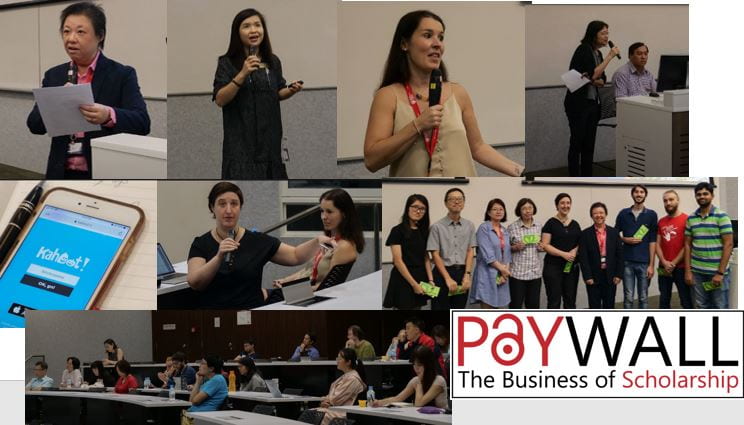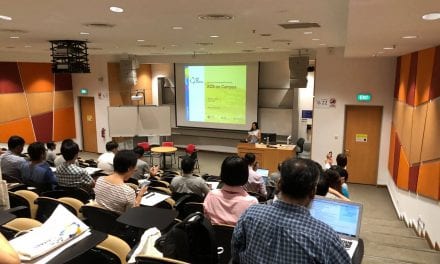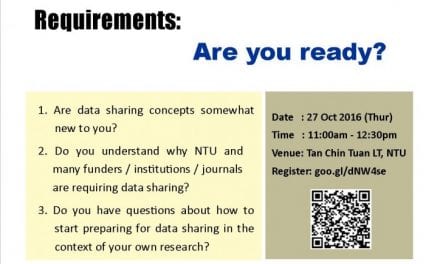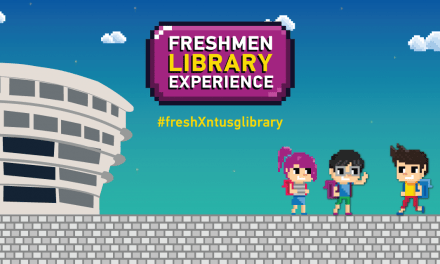In conjunction with International Open Access Week, NTU Library organized Open Access Week @NTU on 24 Oct 2019. About 64 participants from different disciplines, departments and schools attended the event. According to the Scholarly Publishing and Academic Resources Coalition (SPARC), Open Access Week is now a global event entering its twelfth year; it is an opportunity for open access advocates to engage their communities to teach them about the potential benefits of Open Access, to share what they’ve learned with colleagues, and to help inspire wider participation in helping to make Open Access a new norm in scholarship and research.
The event started with a welcome speech by Ms Caroline Pang, Director (NTU Library, Office of Information, Knowledge & Library Services). Caroline aptly said that open access to scholarly research is a topic that is close to the hearts of the academic community and that the community are all highly dependent on access to scholarly research findings in our field in order to contribute to it. NTU Library is supportive of the open access movement and this is the fifth year that Library is organizing an Open Access Week on campus to raise awareness and facilitate community discussions on open access.
This was followed by a screening of excerpt of the film Paywalls: The Business of Scholarship. The film was produced by Jason Schmitt and it strongly advocates open access to research and science. The high profit margin associated with some top academic publishers was questioned and compared with some of the most profitable tech companies like Apple, Facebook and Google. In the film, viewers will get to hear the views of some well-known open-access advocates such as Peter Suber and Paul Ginsparg (Creator of arXiv.org).
Next was a presentation by Ms Goh Su Nee, Deputy Director (NTU Library, Office of Information, Knowledge & Library Services). Su Nee started her presentation with a reminder that NTU as well as Singapore funders require that content be made open access. There are different open access routes and paid open access is gold open access. This route is however expensive and the price range to publish in general science, biology, life sciences and medicine range from a median of $1092 to $1588. In NTU, researchers budget for such cost in their grants. The alternative route to open access at no charge is the green route. Authors submit their papers to subscription-based journals and deposit peer reviewed final accepted version (also known as post-print) after the embargo period, if any, for free in DR-NTU (Open Access). The benefits of depositing content in DR-NTU are greater discoverability and visibility.
Dr Alexa von Hagen, Research Associate from the Centre for Research in Child Development, National Institute of Education, next provided an introduction to the ReproducibiliTea Journal Club. At the heart of ReproducibiliTea is building up open science without top-down initiatives. Amy Orben, Sam Parsons and Sophia Crüwell started this grass-roots journal club in early 2018, at the experimental-psychology department at the University of Oxford, UK. They hoped to promote a stronger open-science community and more prominent conversations about reproducibility. The efforts and initiative of the 3 early career researchers soon paid off, and ReproducibiliTea is now active at more than 27 universities in 8 countries.
NTU ReproducibiliTea Journal Club will kick off its first meeting on Thursday, 31 Oct 2019, from 1 to 2pm, at The Arc – Learning Hub North, TR+18, LHN-01-06. All are welcomed to attend. Click here for more information about the upcoming meetings.
Alexa’s talk was followed by a quiz session where participants answered 6 questions via Kahoot. Each question was followed by a short commentary so that the message about open access can be further reinforced. There were eight winners and each walked away with a $10 supermarket voucher.

Presentation slides:
Using Library Services to break away from paywalls by Ms Goh Su Nee
ReproducibiliTea Journal Club by Dr Alexa Von Hagen






